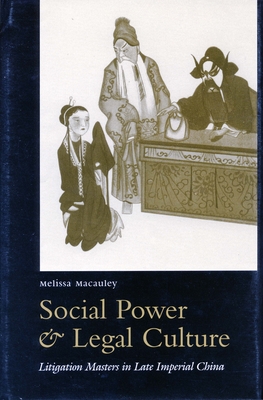

 Stanford University Press
Stanford University Press
Social Power and Legal Culture: Litigation Masters in Late Imperial China


Key Metrics
- Melissa MacAuley
- Stanford University Press
- Hardcover
- 9780804731355
- 9.31 X 6.31 X 1.21 inches
- 1.6 pounds
- History > Asia - China
- English
 Secure Transaction
Secure TransactionBook Description
Asserting that litigation in late imperial China was a form of documentary warfare, this book offers a social analysis of the men who composed legal documents for commoners and elites alike. Litigation masters--a broad category of legal facilitators ranging from professional plaintmasters to simple but literate men to whom people turned for assistance--emerge in this study as central players in many of the most scandalous cases in eighteenth- and nineteenth-century China. These cases reveal the power of scandal to shape entire categories of law in the popular and official imaginations.
The author characterizes litigation masters as entrepreneurs of power, intermediaries who typically emerge in the process of limited state expansion to provide links between local interests and the infrastructure of the state. These powermongers routinely acted in the interests of the local elite and the male lineage. But cases preserved in criminal archives also reveal a clientele surprisingly composed of the subordinate actors in legal disputes--widows fighting in-laws and other men, debtors contesting creditors, younger brothers disputing older ones, and common people charging the rich. Challenging earlier scholarship claiming that the Chinese legal system simply maintained the hegemony of elites and the patriarchal order, this study shows how the legal tools of domination were often transformed into weapons of social resistance and revenge.
The book also examines the manifold ways in which legal practice, Confucian ideology, and popular entertainments like opera and storytelling coalesced into Chinese legal culture. Popular traditions in particular did not simply reflect legal culture but actively influenced it, shaping common presumptions about law that transcended differences of class and region. Exploring Chinese legal culture in the structural contexts of commercialization, changes in property transactions, and ineradicable litigation backlogs, the author explains why litigation was condemned by all classes of Chinese men and women even as all classes litigated.
Author Bio
Melissa Macauley (Ph.D., Berkeley, 1993) specializes in late imperial and modern Chinese history. Her research interests include social history and legal culture, the interconnected history of southeast coastal China and Southeast Asia, the dynamics of transnational crime in the context of migration and trade, and the transformation of non-Western law in the age of colonialism and imperialism.
She is completing a book on the entangled history of a region on the southeast coast of China (Chaozhou or Teochew) and the port polities of the South China Sea from the seventeenth century to 1927.
Her first book, Social Power and Legal Culture: Litigation Masters in Late Imperial China, was named a Choice Outstanding Academic Book in 1999. Her work has been supported by the American Council of Learned Societies, the National Endowment for the Humanities, the Mellon Foundation, the U.S. Department of Education (Fulbright-Hays), and the Bunting Institute of Radcliffe College, among others.
She also has served as the An Wang Postdoctoral Fellow in Chinese Studies at Harvard University, a member of the Institute for Advanced Study (Princeton, NJ), and a Senior Research Scholar at the Institute for Qing History at Renmin University (Beijing). She was awarded a Distinguished Teaching Award in 1999 and named a Charles Deering McCormick Professor of Teaching Excellence in 2004.
Source: Northwestern University Department of History
Videos
No Videos
Community reviews
Write a ReviewNo Community reviews